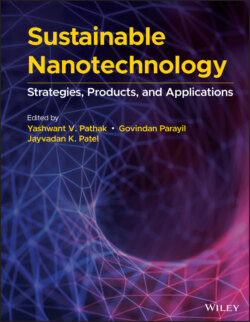Читать книгу Sustainable Nanotechnology - Группа авторов - Страница 14
1.1 Introduction
ОглавлениеSustainable development is not a newly constructed idea. Since the 1970s, conversations about this particular field have been fueled by the fear that the world cannot sustain an immense growth in human population and economic activities without damaging the environment and our social fabric. Concerns that at some point in the not too distant future, we will reach a “limit to growth” prompted policy‐makers to urgently seek solutions for global sustainability, a concept that is so vast that it is subject to various interpretations. The vastness of the topic, however, still generates three aspects that global sustainability can affect. There is a global consensus that is agreed upon by the general public and the business community at large that environmental responsibility, economic efficiency, and social equity are necessary conditions for attaining global sustainability. Environmental responsibility, as the name suggests, is concerned with the conservation of resources – i.e. food, water, energy, etc. and safe methods of disposal of waste products of all forms. Likewise, economic efficiency focuses on resource production and meeting the demands of the market place. It is concerned with open trade and no inhibition in terms of the allocation of resources for production. Social equity, on the other hand, is concerned with the distribution of resources based on the productivity of an individual or an organization. In other words, social equity allows people to make decisions and ensures that the rewards that they get are based upon their efforts [1]. So, why address sustainability? Today, concerns for maintaining sustainability have increased, especially among the younger generation. Concerns about the availability of natural resources and the safe and efficient disposal of the by‐products of our production and consumption practices have added urgency to transitioning to a sustainable future. Consequently, finding solutions to these concerns have focused on using innovative science and technology applications. Therefore, applying nanotechnological research to maintain global sustainability has become a priority [2].
Nanotechnology refers to understanding and control of the material at the nanoscale. For reference, a nanometer is one billionth of a meter. The field was introduced almost half a century ago and, over time, it has established itself as an active research area [3]. It incorporates nanoscale science, engineering, and technology – three very useful fields with various applications. At the nanoscale, materials show unusual biological, physical, and chemical properties. In fact, according to quantum theory, nanomaterials, with size being within the range of 1 and 250 nm, lie between the quantum effects of atoms, molecules, and the bulk properties of materials. This nanoscale is known as the “no‐man’s‐land” where their properties are controlled by the phenomenon that has its own critical dimensions. The structure of nanoparticles can be manipulated to produce materials with desired properties. Using nanomaterials with these unusual properties gives us an opportunity to enhance existing technology with profound features that have technical, economic, and societal implications [4]. Advocates of nanotechnology claim that the combinations of nanotechnology with various fields such as information technology, biotechnology, and cognitive sciences produce far‐reaching advances. In terms of global sustainability, nanotechnology’s influence in various areas can change the future of our efforts for sustainability [5].
There are many fields in which incorporating nanotechnology can lead us to global sustainability. The three focus areas are the environment, the economy, and society. There are various fields in which nanotechnological research has already affected the growth. This chapter focuses on the fields of medicine, food, environment, health, and industry. These fields fall perfectly under the three focus areas of global sustainability. The nanotechnology‐based research done under these fields has not only enhanced them but also made them safe and sustainable.
